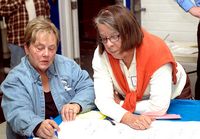Subscriptions
Menu
Advertisements
Central Bridge begins working on its future
10/18/2017 |
By Patsy Nicosia |

Time flies, but still, you don’t have to be that old to remember when the hamlet of Central Bridge was filled with well-kept, historic homes with a handful of mostly mom and pop businesses kids could bike to after church or school.
Hoping to find ways to return Central Bridge to those days, about 50 people gathered at the firehouse Thursday for the first in a series of revitalization workshops being funded through a $50,000 state Community Development Block Grant awarded last December.
“When I was a kid, this was a vibrant community,” Schoharie Supervisor Chris Tague, who grew up in Central Bridge, told the crowd.
“But over the years, it’s no secret that it’s gone downhill. What’s been lost is an historic community. But we can make it vibrant again.”
Hoober Feeds, which reopened the Central Bridge feed mill in 2016 and now employs 10 people, most of them local, is a giant step in the right direction, Mr. Tague said.
There are plans in the works for a Laundromat and coffee shop in the hamlet—which is shared by the Towns of both Schoharie and Esperance—he said, and the former Red Door Deli on Route 7 has been razed so something new can be built there.
Longtime water and sewer issues have been addressed as well, Mr. Tague said.
“The q uestion is: What’s next? What should our priorities be? How can we make this a better place to live?”
Those are just some of the questions asked by consultants Nicole Allen and Matthew Rogers from the Laberge Group, which is working with SALT Development and CLA Site on putting together a community development plan for Central Bridge.
The plan is a necessary step in seeking grants for things like housing, Ms. Allen explained.
Part of the process, she said, will be an income survey. The results will be kept confidential and residents will be asked only for an “income range.”
That’s necessary, Ms. Allen explained, because income levels in the Towns of Schoharie and Esperance are too high for most available starter grants; in Central Bridge, they are not.
“We’re going to be coming knocking at your doors…We cannot do this without your help,” she said.
Thursday, workshop participants spent an hour and a half working in small groups to brainstorm answers to questions like: You’re king for a day with $500,000 to $1 million to spend. How do you use it?
They were also asked to list the hamlet’s strengths, weaknesses, and opportunities.
When they were done, the half-dozen tables shared their results with the consultants.
Though one group said it would use that $1 million as small grants to let homeowners fix up their properties, most agreed they’d put it into sidewalks.
“You can’t have anything without sidewalks,” said one group’s spokesman, especially since some of the other ideas focused on improvements to the village park and walking trails along the creek.
Water and sewer are seen as big plusses as is Central Bridge’s proximity to major highways, but most agreed they don’t want to be a bedroom community to the Capital District and would rather find ways to attract well-paying local jobs.
Workshop participants also see Central Bridge as a safe, attractive place to live and raise a family.
The workshop kicked off with a potluck dinner and tours at Hoober Feeds.
The next session will be a Complete Streets Public workshop at the Central Bridge United Methodist Church on Monday, November 13, with a pot luck at 5:30pm, followed by the workshop at 6:30pm.









